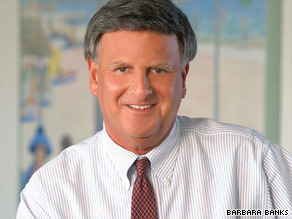Bob Greene's new memoir is titled "Late Edition: A Love Story"
The book chronicles his tenure at an Ohio newspaper in the 1960s

Bob Greene recalls a 1967 lesson in manners from Ohio State University football coach Woody Hayes.
July 12, 2009 - 2 hours, 59 minutes ago
By Bob Greene
CNN Contributor
Editor's note: This is an excerpt from CNN Contributor Bob Greene's new book, "Late Edition: A Love Story," a memoir of his time working at an Ohio newspaper in the 1960s.
The localness of what we did down at the paper defined everything. Even as a kid brand-new to the staff and brand-new to the newspaper business, hired to work during summer vacations, I could tell that.
It was a localness not confined to the geographic scope of our news coverage -- it went without saying that the Columbus, Ohio, Citizen-Journal wasn't about to send its reporters to Africa or France (or even to Kentucky or Indiana). The men and women in the city room arrived at work each day knowing that they weren't going to be assigned to anyplace from where they couldn't drive back to the office by deadline.
The localness extended beyond that, though, and infused the very feel of the place. One night in the summer of 1967 the phone on the sports desk rang and I picked it up with the customary: "Sports!"
The person on the other end said:
"Now, that's no way to answer a telephone, is it?"
"Who's calling?" I said.
"To whom am I speaking?" the caller said.
"This is Bob Greene," I said.
"Now, I've seen your name in the paper," the caller said. "It's Bob Greene Jr., isn't it?"
I had been permitted to write a few sports stories that summer; I used the "Jr." at the end of the byline.
"Yes," I said. I thought I recognized the voice from somewhere.
Don't Miss
Greene: Farrah in the morning
In Depth: Commentaries
"Now, I believe I know your mother and father," the caller said. "Are your parents Robert and Phyllis Greene, from Bexley?"
"Yes," I said.
"I know they didn't raise you to answer a phone that way," the caller said. "When you answer a business telephone, the proper way to do it is to tell the caller your name first."
"All right, sir," I said.
"I know your parents are fine people, and I'm sure they taught you good manners," the caller said. "You don't want to disappoint them by giving a bad impression of yourself on the telephone, do you?"
"No, sir," I said.
"Good," the caller said. "Now, this is Woody Hayes. I was calling to speak with Tom Pastorius. Is Tom there, please?"
And, my hands shaking, I connected him with Pastorius, one of the paper's sportswriters.
I knew it really was the head coach of the Ohio State University football team because of that phrase early in his lecture to me -- "To whom am I speaking?" His grammar was always scrupulous -- no "Who am I speaking to?" from Woody Hayes.
The localness was all around us. Woody had met my mother and father on a few occasions, he remembered them, and he was setting their son straight. He may have been the most nationally famous person in the community, but he was first and foremost a member of that community -- during all his years as head football coach at Ohio State, Woody kept his home telephone number listed in the Columbus phone book: W.W. Hayes, on Cardiff Road. That made for a lot of late-night crank calls from a lot of insulting or drunken people, but he thought that if he was going to represent the community, then he should be as available as any other man or woman in town.
Once, years later, I heard a story -- I'm almost certain that it was Citizen-Journal sportswriter Kaye Kessler who told it. It seemed that very early in Jack Nicklaus's golf career, Nicklaus's father, Charlie, a Columbus pharmacist, was following his son on tour, and Woody Hayes offered to travel with Charlie Nicklaus to keep him company and provide moral support. Apparently at one tournament someone in the gallery kept referring to Nicklaus as "fat Jack" -- Nicklaus was a little hefty in those younger days. And, the way I remember the story, either Woody Hayes had to physically restrain Charlie Nicklaus from going after the fan, or Charlie Nicklaus had to restrain Woody. (I have a feeling I know which one was which.)
It was all part of the localness. Woody Hayes and Charlie Nicklaus were two Columbus residents on the road to cheer for a local golfer; the fact that the local golfer would become the greatest ever to play the game was incidental. And we -- in the eyes of our readers, and in our own eyes, too -- were, proudly, the local paper.
That was all, and everything, we aspired to be. Just like the proud local papers in a thousand other American towns. "I know they didn't raise you to answer a phone that way," Woody said. He thought, by saying it, he was doing me a favor. He was.
Excerpted by permission from "Late Edition: A Love Story," published this week by St. Martin's Press.
2009 - CNN



